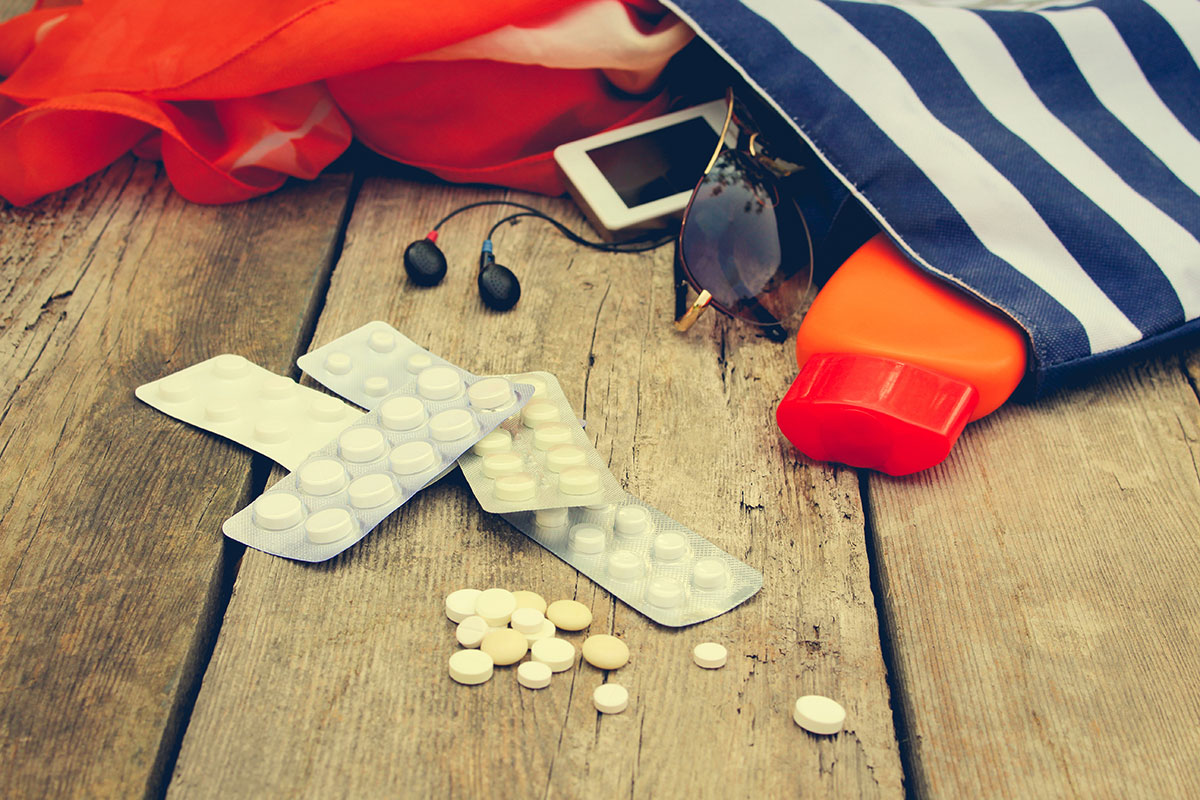Travelling with medication shouldn’t be the cause of a headache, instead it just requires some planning and preparation.
First things first, you need to research your destination and ask a physician whether you need any specific vaccinations. If not, then we’ve got you covered on the rest of the things you could consider packing.
Packing essentials and prescriptions
If you have daily medication then be sure to get enough for the time that you will be away. Daily vitamins will be easier to pack if you take only the required amount, rather than the whole bottle.
Are you taking prescription or chronic medication? Be sure to get enough at your pharmacy or get a letter from your physician if you need to fill your script while abroad.

Here are a few essentials worth packing:
- Prescription medicines you usually take. If you can, keep it in its original packaging and take along your prescription – just in case you are stopped at check-in.
- Severe allergies that require prescribed epinephrine? Bring along your auto-injector (e.g. EpiPen) and keep it handy.
- Take along certified copies of your health insurance card and your provider’s claim forms. Store digital copies on a cloud-based server like Dropbox. This way you can access it if you lose your hard copies.
Remember to pack your prescription medications in your carry-on luggage in case your checked luggage is delayed or lost. Packing medicines in your carry-on means you will also have immediate access to it.
Your medication needs refrigeration
Medicines needing to be refrigerated can be carried in an insulated medication bag, travel cooler or even insulated lunch bag. Not all tour buses will have enough space in the fridge and you could ask at the hotels if you do not have a bar fridge in your room.
You use a sleep apnea machine
These machines are quite small and the newer ones are quite silent. For solo travellers, if your machine is not silent, be sure to inform the tour operator as it may disturb your roommate. If your machine is on the noisy side, then a single room upgrade might be the best option.
Destination or trip-specific medical precautions
Certain destinations may require extra precaution while traveling, eg. malaria areas and those that require vaccinations. It would be best to ask your physician about the necessary treatments or medication to take before.
If you’re travelling to malaria-infested areas then a physician will provide you with a prescription for preventative medication. Also be sure to take some insect repellent along, or buy on arrival.

While not likely, you may need to change your chronic medication dosage as there are environmental factors to bear in mind – altitude and humidity could trigger certain symptoms, as could air pollution.
Added extras
While these do not fall under the essentials category, they’re always handy to have while travelling, just in case:
- Medicine for pain or fever (e.g. acetaminophen, aspirin, or ibuprofen)
- Mild sedative or other sleep aid
- Antidiarrheal medication (e.g. bismuth subsalicylate and loperamide)
- Antihistamine
- Insect repellent suited to the climate you’re visiting (enquire at an outdoor store)
- Sunscreen with UVA & UVB protection (at least 15 SPF)
- Sunburn solution, e.g. aloe gel
- Hand sanitiser and/or antibacterial wipes
- Eye drops

Do you have any other questions about travelling with medication? Feel free to get in touch with the Expat Explore team ahead of your journey. We’re ready to provide any info you need.

2 responses to “Travelling with medication: All you need to know”
I have a cpap machine for sleep apnea am i allowed to take it to Cambodia, Veitnam and Laos without getting a letter from my doctor Thanks
Hi Evelyn
Thank you for your message. How exciting that you will be going on an adventure of a lifetime with us!
A customer service representative will be in touch with you shortly regarding your query.
Should you have any further queries, please do not hesitate to contact us.